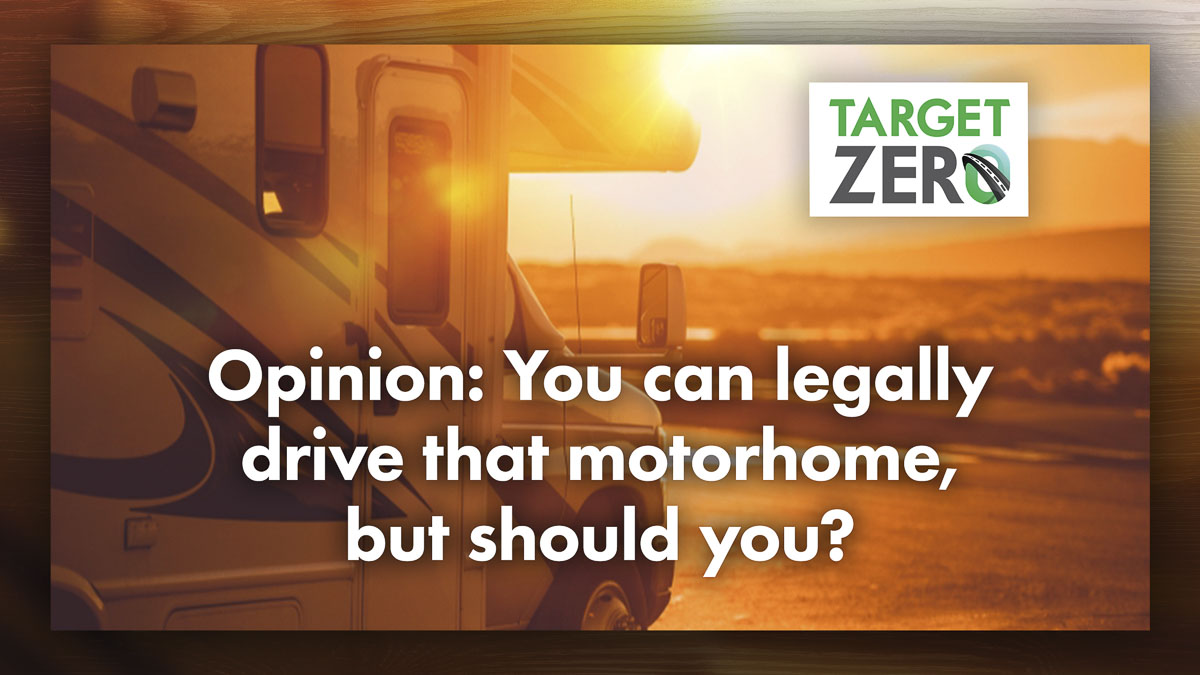
Target Zero Manager Doug Dahl answers a question about licensing requirement or training for driving bus-sized vehicles
Doug Dahl
The Wise Drive
Q: I was in the right lane of a two-lanes-in-each-direction road. An RV came up in the left lane and swung slightly right – wheels still in the left lane, but wide-mounted mirrors extending into my lane. The RV’s mirror passed over my driver’s side mirror by a few inches. If I’d been in a taller vehicle they would have clipped. It seems the driver wasn’t aware of the size of their vehicle. Is there any license requirement or training for driving bus-sized vehicles?
A: Imagine you’ve hired a contractor to build you a brand-new house. On the day of completion the contractor hands you the keys and says, “I did the absolute bare minimum to meet code requirements. Enjoy your new house.” That doesn’t inspire a lot of confidence, does it? I have a similar lack of confidence in RV drivers who rely only on their experience driving the family minivan in preparation for operating a 45-foot motorhome.

When my kids were young we had a oft-repeated phrase in our home: just because you can, doesn’t mean you should. I’ve since realized that this is a good mantra for adults, too (myself included). Yes, you can legally drive a three-million dollar bus conversion (assuming you have money to burn) with just your standard issue driver license and no practice, but should you?
Washington’s commercial driver license (CDL) law applies to drivers operating vehicles with a gross vehicle weight rating (GVWR), or actual weight, of at least 26,001 pounds. That could be a single vehicle, like a motorhome, or a combination that includes a trailer of at least 10,000 pounds. But there’s an exception. If you’re “operating a recreational vehicle for noncommercial purposes” you don’t need a CDL. Conceivably then, if you had a family band that traveled to gigs in a big enough RV you’d need a CDL, but you wouldn’t need one to visit the Grand Canyon.
That’s not how it works in every state though. A few states don’t make an exception for noncommercial driving, and some have noncommercial special licenses for driving large vehicles (typically over 26,000 pounds). I get that an RV driver wouldn’t want to go through commercial driving training, but I think it makes sense to have an RV endorsement, and the training to go with it, to drive big RVs.
But special endorsements wouldn’t solve the lack-of-training problem for most RV owners, because most RVs aren’t over 26,000 pounds. You can even find 40-foot motorhomes that barely squeeze under the limit. The solution, then, is individuals making a commitment to get the training they need to become skilled and safe drivers of whatever size vehicle they operate.
Sure, training can be expensive. But the first time you scrape the side of your RV across the bollards at the gas station you’ll spend more on repairs than you would have in an RV driving class. Plus, if you’re driving a vehicle that’s five times the size and weight of a family car, you have a moral obligation, if not a legal one, to be qualified to operate it.
That’s what it comes down to. Are we the kinds of drivers that have absolutely bare minimum skills to legally drive, or do we strive to be excellent drivers? There are a lot of things in life that involve risk but require minimal to no proof of skill; cliff diving, rock climbing, storm chasing, base jumping, parenting. I wouldn’t settle for the bare minimum when engaging in any of those (especially parenting). A driver license isn’t proof that you’re a good driver. It’s just a starting point.
The Wise Drive is hosted by Doug Dahl, a Target Zero manager for the Washington Traffic Safety Commission.
Also read:
- Letter: ‘It’s said sarcasm is the lowest form of wit’Amboy resident Thomas Schenk criticizes Olympia’s use of “emergency clauses” and other legislative tactics that limit public participation.
- Letter: ‘We’re going to give them some money and a plane ticket, and then we’re going to work with them’Camas resident Anna Miller supports a new structured self-deportation policy, calling it a balanced approach to immigration and economic needs.
- Opinion: What the 2025 legislature tells us about why Washington’s government keeps failingTodd Myers of the Washington Policy Center argues that Washington’s government fails because it resists humility, experimentation, and accountability in its policymaking.
- Letter: Vancouver needs broader leadership than just a teacher’s lensVancouver resident Peter Bracchi urges Mayor Anne McEnerny-Ogle not to seek another term, calling for more diverse and inclusive leadership rooted in broader experiences.
- Opinion: Legislative session ‘was full of ups and downs and many learning experiences’Rep. John Ley reflects on the 2025 legislative session, highlighting local funding victories and warning of major tax increases passed by the majority.










